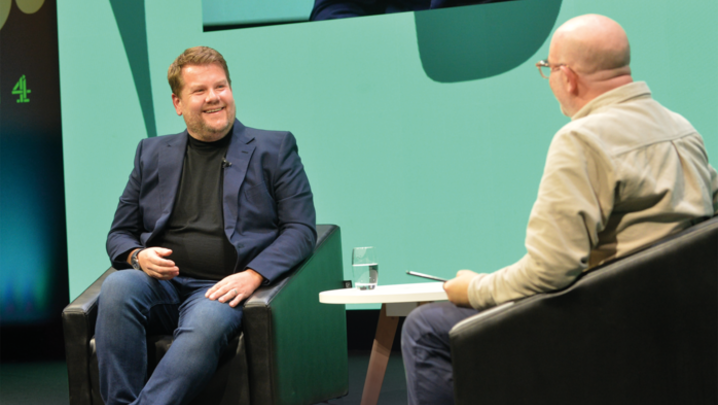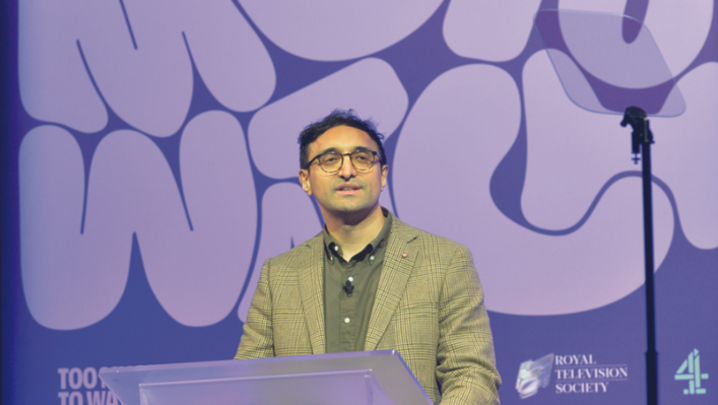The idea that I got to watch things and got paid for it was mind-blowing.” For Kate Ward, television has been a big part of her life.
As she confessed, she is an “unashamed TV addict – I loved it, and I still love it”. As the London-based President of Vice Studios, the international TV and feature-film production arm of Vice Media Group, she commissions content for Vice’s worldwide outlets and for third parties, such as Netflix, Disney and Amazon, and oversees sales from a catalogue comprising 900 hours of shows.
Ward detailed her career to the RTS at an event chaired by Manori Ravind- ran, international editor of Variety.
She revealed that she once wanted to make and/or present history programmes, but her professional life in TV began in distribution: she was employed by specialist factual distributor TVF International, before she joined Shine and rose to be director of distribution at EndemolShine.
The experience “left me with a passion for the international business and the format business”.
She went on to be president of international for the US young women’s online lifestyle brand Refinery29. The role attracted her because of the company’s focus on digital.
In late 2019, Vice acquired Refinery29, and Ward took charge of the assimilated entity. The deal was designed to unite two digital-centric media businesses and then diversify beyond Vice’s male-skewing core audience.
“The two businesses maybe had slightly different audiences, but there was a huge amount of common ground. Vice had a slate of really excellent documentaries – and there was a huge amount of mutual respect for the journalism,” said Ward of Vice’s acquisition of Refinery29. “To return to the TV business at a time when there was an explosion of content... was an attractive proposition.”
The move was another sign that Nancy Dubuc, the veteran US TV executive who took over as CEO of Vice Media in 2018, was determined to reinvent Vice. The former digital upstart had lost its way amid allegations of sexual harassment and a “boys’ club culture”.
Ravindran also noted other difficulties Vice had experienced, with “the channel [Viceland] and content not getting sufficient notice because of low viewership”. Ward responded: “We’ve diversified now, both by genre and by geography.
It is driven by thinking about how we work with US premium cable and streamers, and internationally with linear channels. We really wanted to be part of that explosion of demand for content.”
What, then, of the company’s culture? Ravindran quoted Dubuc’s desire to “stamp out bro culture”, employ more women and boost inclusion. What did Vice stand for now?
Ward said that the company had evolved for the better under Dubuc’s leadership and, thanks to “the incredible work we have done to support that change”, had developed an inclusive culture. “We’re at this incredibly interesting moment... Vice exists to give voice to emerging voices and talent rooted in youth culture.
“What excites me about Vice Studios is that we tell stories that others don’t tell, and with access that others don’t have. Whether it’s our journalism, our entertainment or reflecting the forefront of culture, we try to be there first...
“Vice is more than 25 years old, so I think that speaks to this desire to regenerate – and it can continue to deliver for the audience.”
Vice Studios, which launched in 2017, has produced such fare as Diego Osorno’s 1994 for Netflix, The Satanic Verses: 30 Years On for the BBC and Britain’s Cocaine Epidemic for Channel 5. Ward’s commissions embrace feature films, scripted series, formats and “premium, 90-minute documentaries”.
She explained: “The common thread has been, ‘Is it reflecting culture and is it giving voice to under-represented voices? Is it challenging and speaking truth to power?’”
How has Vice Studios’ production pipeline been affected by the pandemic? “It was obviously a year like no other – the resilience, the innovation, the tenacity of the industry was extraordinary,” said Ward. Its global business had mitigated the worst effects of the crisis because it was able to “move things around”.
Accelerated demand for unscripted content had helped, too, she said: “The scripted business, like everyone else’s, will fire back to full superpower this year and beyond. But I think that explosion of demand for unscripted content has allowed us to accelerate things.
“Covid has posed some big questions about what people want to watch. We’re still solving those big creative questions but there is a sense of optimism.”
Vice Studios recently announced that it was making a true-crime series, Indian Predator, for Netflix in India, “a super-premium” documentary with the potential to become a global suc- cess, it believes, that attempts to get into the minds of serial killers.
“It’s a documentary series full of suspense and full of intrigue,” said Ward. “It is content that hasn’t been [seen] before in the unscripted space and is delivered with an authentic local perspective.” She believed that “super-premium factual shows” represented a big opportunity for Vice Studios.
Beyond London, the company has offices in New York, Los Angeles, Toronto, Mumbai and Mexico City, where Ward said it had led the way in Spanish-language documentaries, such as The Three Deaths of Marisela Escobedo, which chronicles a bereaved mother’s quest for justice. The film reflected the themes Vice Studios was interested in – justice, crime, identity, and speaking truth to power.
On the digital front, globally, Vice publishes “1,500 pieces of content a day”, ranging from feature-length content to news briefs at Vice News.
With 350 million people a month accessing Vice’s channels worldwide, Vice Studios is in a unique place to understand young audiences and their digital tastes and to predict trends. Vice Studios can tap into other parts of the group, including Refinery29 and
Motherboard, which covers technology. “We work closely with digital,” said Ward. “We are always thinking about how we can translate those amazing pieces of IP into traditional TV.”
A recent example is Shine True, a factual series exploring the experience of trans and gender non-binary young people at pivotal moments in their lives. The inspiration was the digital short-form series Clothes Minded.
But it is the big shows that attract most attention. With a lot of companies competing for commissions from the major streamers, Ravindran asked what Vice’s strategy was for pitching to Netflix and even Disney+. “There are more buyers,” replied Ward, “but it has always been competitive.... It doesn’t make it easier, you have to be as sharp as you ever were.... Audiences for challenging feature documentaries that, before, might have been niche, are now attracting mainstream audiences.” She revealed that Vice Studios was working with Disney but declined to provide details.
The event chair turned to the distri- bution side of the business: what were the key markets for Vice content? Ward highlighted the group’s partnership with SBS in Australia, including the SBS Viceland channel.
Documentaries were driving Vice’s catalogue and she highlighted Dark Side of the Ring, about professional wrestling. Sports, pop culture and entertainment were also doing well.
“The distribution business launched at the right time – last summer, at the height of the pandemic,” she noted, adding that “being an independent allows us to sell to everyone”.
Did the Vice sales arm ever run into censorship problems, given the edgy nature of some of its fare? “Bong Appétit and Weediquette are amazing shows but they’re unlikely to be broadcast by a UK linear broadcaster,” Ward conceded. “But that doesn’t mean we can’t pro- duce other powerful content for the UK market. You always have to be culturally sensitive and put an audience first.”
Report by Omar Mehtab. Kate Ward, President of Vice Studios, was in conversation with Manori Ravindran, international editor of Variety, for the RTS on 4 March.







